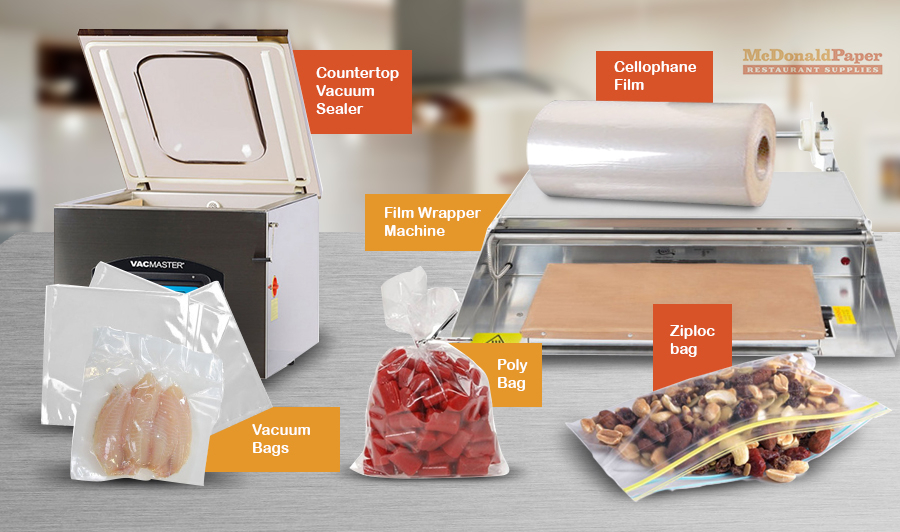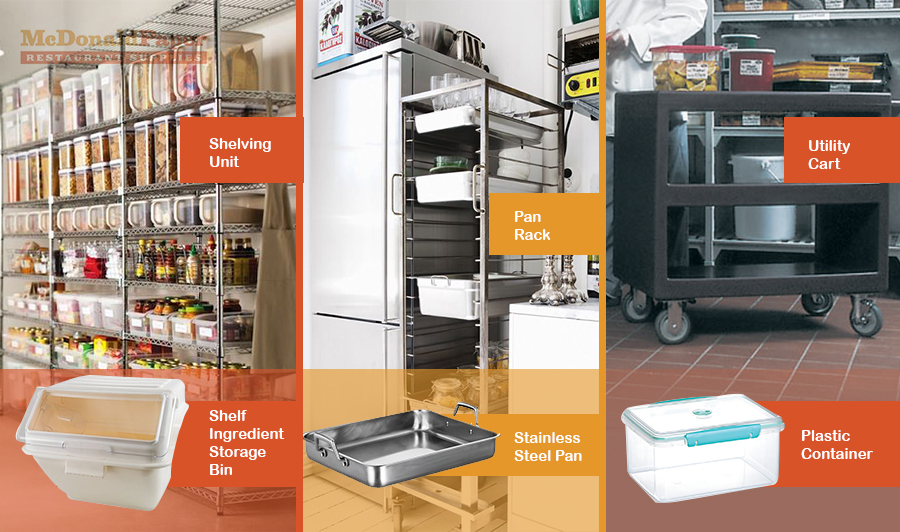Food goes bad quickly, but with the right food storage techniques and practices, extending the life of food is possible. A major problem is that chefs, both professional and non-professionals, often don't know which food storage practice is correct.

Everyone seems to make food storage mistakes. But you can also learn from the storage mistakes that restaurants are making and change to a proper storage habit.
1. Wrong Usage of Vacuum Seal Bags
Vacuum seal bags greatly increase the lifespan on food. FoodSaver claims meat, which may only stay good for six months, can have its shelf life extended to two to three years in a vacuum sealed bag.
And there are a few mistakes that restaurants make when using vacuum seal bags:
-
They seal items that will be used the next day in vacuum sealed bags. Vacuum sealing is best for items that may not be ordered or eaten daily. The seal maximizes the freshness.
-
Failing to inspect the seal of the bag leads to freezer burn and less longevity. A good seal across is needed to properly seal the food. A slow leak, over time, can lead to freezer burn. Improper seals can be caused by air bubbles, moisture or even a wrinkle in the bag.
Vacuum sealing the right way may means inspecting the area to ensure that it's nice and dry. Several inches of space needs to be given to the bag to ensure that if a second seal needs to be made, there's enough room available.
Inspect the seal after every sealing to ensure that there is no air leakage.
2. Improper Use of Food Containers
Food storage containers seem simple enough. You store your food in the container, close the lid, and open the container again when it's time to use the food. But the problem is more with what was previously stored in the food storage containers.
Plastic storage containers tend to hold on to residue.
A lot of people, especially at-home cooks, will wash their plastic containers with soap and then start to notice that their food has an odd, soapy taste.
The quick and easy way to avoid this is to use glass food storage containers.
Glass will not hold on to the residue in the same way plastic does, and you don't have to worry about BPA, a chemical found in plastic, seeping into the food when it's stored hot.
Some plastics are also more porous, and this allows them to hold on to the food particles. Heat is a main contributor to both the plastic holding on to the food and the chemicals leaching out of the plastic.
If you must store items in plastic, let the food cool prior to storage. Heating in the plastic containers will also lower their lifespan and increase the risk of food particles entering the plastic pores.

3. Cross Contamination of Uncooked Poultry
Cross contamination is a serious problem, and it's an issue that can lead to food poisoning and a restaurant being closed down. Before mentioning which food storage containers are safe, it's worth understanding how cross contamination occurs.
There are several areas of contamination.
Raw poultry on a cutting board can contaminate tomatoes if they're cut on the same cutting board without cleaning it.
Chicken needs to be kept at under 40 degrees for bacteria growth to not occur. But there are times when chicken is being marinated or kept in the refrigerator because it's going to be used in the next few days (2 or less is ideal).
There are a few key things here:
-
Keep the chicken at the back of the refrigerator to keep it as cold as possible
-
Keep the chicken on the lowest shelf possible
Juices can drip on to other food causing contamination. Zip-locked bags are a great option when marinating chicken. A lot of chefs also recommend placing the chicken in a roasting pan that has high sides so that if a bag or container leaks, the juices remain in the pan, not drip on to other food.
4. Not Following Labeling and Dating Recommendations
Food storage containers and lids should have a place for labeling and dating. Organization is key, and a major issue with food storage is that it's not permanent. Food items have an expiration date even when they're stored in zip-lock bags, vacuum sealed bags or in the freezer.
Not too long ago, an employee at a restaurant mixed a chemical into a woman's drink because they thought it was sugar. And the woman is in critical condition as a result.
Storage containers should always be properly labeled and stored. This includes any chemicals that may be in the kitchen as well as food. Bins filled with sugar should be labeled so that an employee doesn't accidentally use baking powder instead of sugar.
These mistakes can and do happen.
Labels should contain a minimum of the following information:
-
Item name
-
Date stored
-
Used by date
A lot of restaurants are also requiring employees to write their name on labels so that they can be held accountable for their own actions.
Foods that require temperature control and time control should be discarded at the used by date. The first day that the food is made is the countdown day for the expiration date. Some food items will also be stored for a short amount of time, for example tuna salad may be stored for six hours to cool.
These items may have labels stating the time they need to be removed from the refrigerator.
Containers may also be used for food being served that starts to spoil at a certain time. This may mean that the food needs to be discarded at 2pm because it was made at 8am and will be sitting out for six hours.
Food Storage Items to Properly Store Food
Food storage pays for itself in food saved rather than food spoiling. Storage is about making sure that your food items remain fresh for longer. A variety of items can be utilized to properly store food:
Storage Items |
Cheap vs. Expensive Option |
|
Vacuum Seal Bags |
$32.5 per 1000pcs - SafePro V68 (6x8 inch) |
|
Plastic Storage Containers |
$1.76 per 1pc - Winco PPRC-1W (1 quart) |
|
Food Storage Boxes |
$7.30 per 1pc - Winco PFHW-3 (18x12x3 inch) |
|
Zip-Locked Bags |
$22.99 per 1000pcs - SafePro SZB (6x6 inch) |
|
Labeler |
$59.99 per 1pc - Garvey 22-6 |
|
Glass Jars |
$2.18 per 1 pc - Circleware B500345 (15 oz.) |
Food storage is serious business. Failing to store food properly can lead to food spoiling faster, sickness if the food is eaten and wasted money. The mistakes above should be avoided at all costs.
What are the best food storage containers?
View our equipment catalog to find the industry's leading storage containers.


